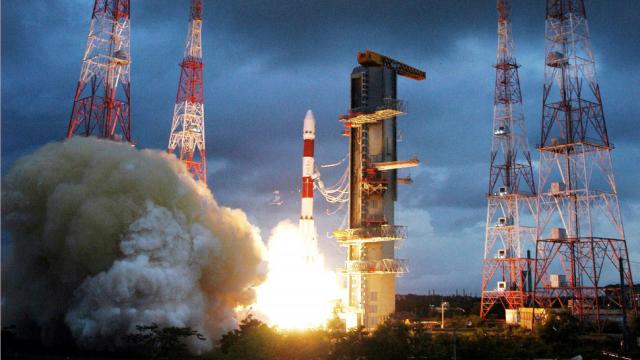Today, a four-stage Polar Satellite Launch Vehicle will blast off from India’s southern spaceport with 104 satellites on board. Should all go well, the Indian Space Research Organisation will establish a new satellite delivery record for a single mission — and by a long shot.
A PSLV lifts off (Image: ISRO)
The current record is held by Russia, which delivered 37 satellites into orbit during a single mission back in 2014. The NASA record is 29, which it accomplished in 2013, and the current Indian record is 20 satellites in one go, which it set last year. With its planned 104-satellite launch, India’s frugal space agency is set to make a statement as it continues to weave its way into the international space scene.
The launch is scheduled for 9:28AM local time (2:58PM AEDT) at the Sriharikota spaceport. At the top of the 44m-tall PSLV rocket are 104 individual satellites, including an Indian-built, Earth observing Cartosat-2 series satellite weighing 714 kg, and 103 nanosatellites totalling 664kg. In total, the rocket will deliver 1378kg worth of satellites into Low Earth Orbit (LEO). This rocket is capable of delivering 1751kg of payload to LEO, so it will be carrying nearly 80 per cent of its total payload capacity. This mission will mark the PSLV’s 39th trip to space, in what is turning out to be a dependable, workhorse rocket for ISRO.
In terms of who owns and operates the nanosatellites, Israel, Kazakhstan, Switzerland and the United Arab Emirates each have one; India has two; and the United States has 96. ISRO charges a handsome fee for these deliveries, which, given the growing market for mobile phones, internet and other satellite-dependent industries, is becoming a lucrative business.
Getting 104 satellites into orbit — 67 more than the previous record — won’t be easy. “All the satellites will be put in the same orbit, which poses a different challenge,” noted ISRO chairman A.S. Kiran Kumar in a statement, adding that no manoeuvring will be done during the mission. Once these satellites are dispatched, they will be on their own.
With this mission, ISRO continues to break new ground, especially in terms of its ability to plan and deploy low-cost missions. In 2013, the space agency sent a satellite to Mars at a cost of $US73 million ($95 million), which is about $US600 million ($784 million) less than a similar NASA mission to the Red Planet. Looking ahead, India’s space agency hopes to visit Jupiter and Venus.
You can watch today’s launch live right here.
